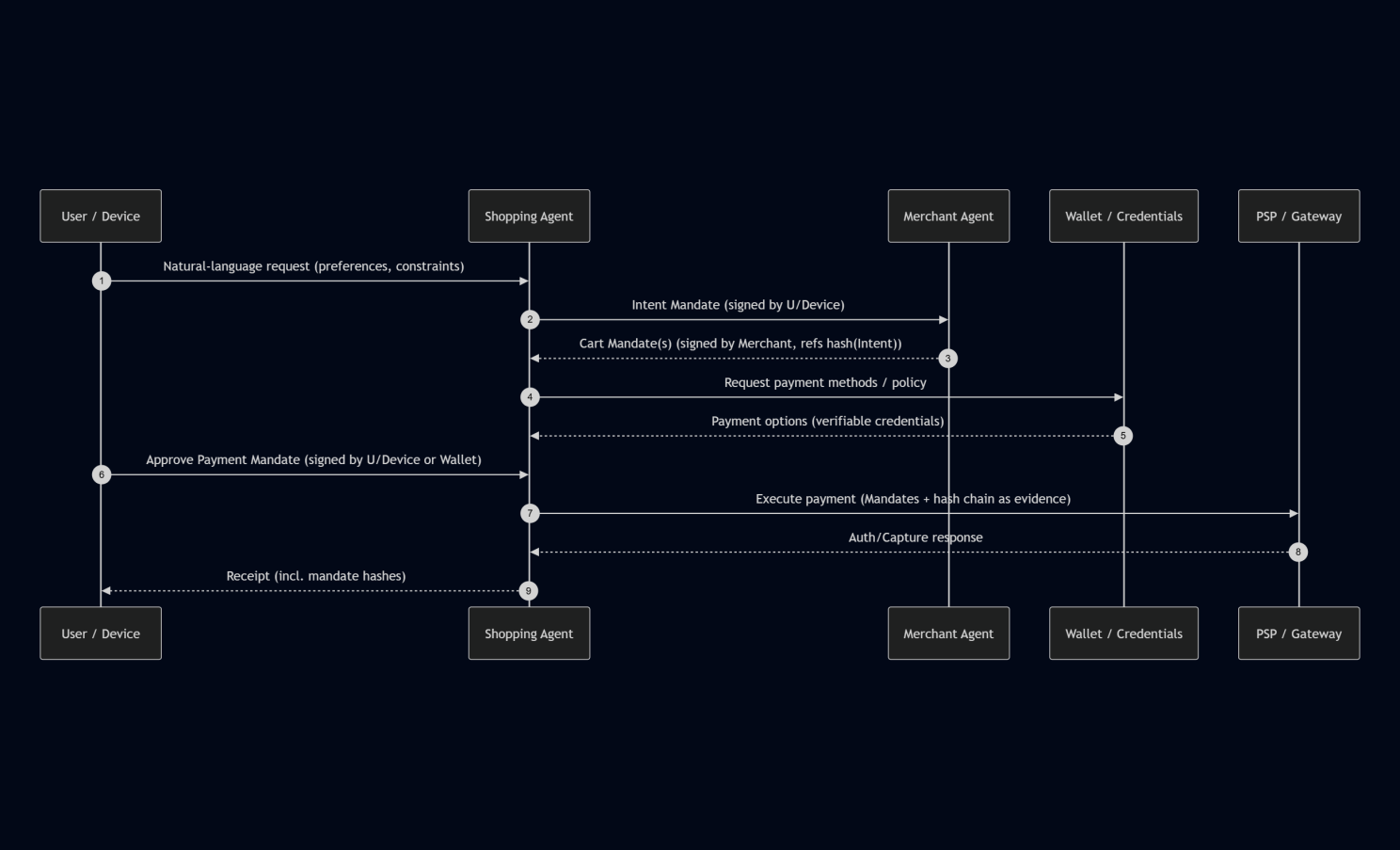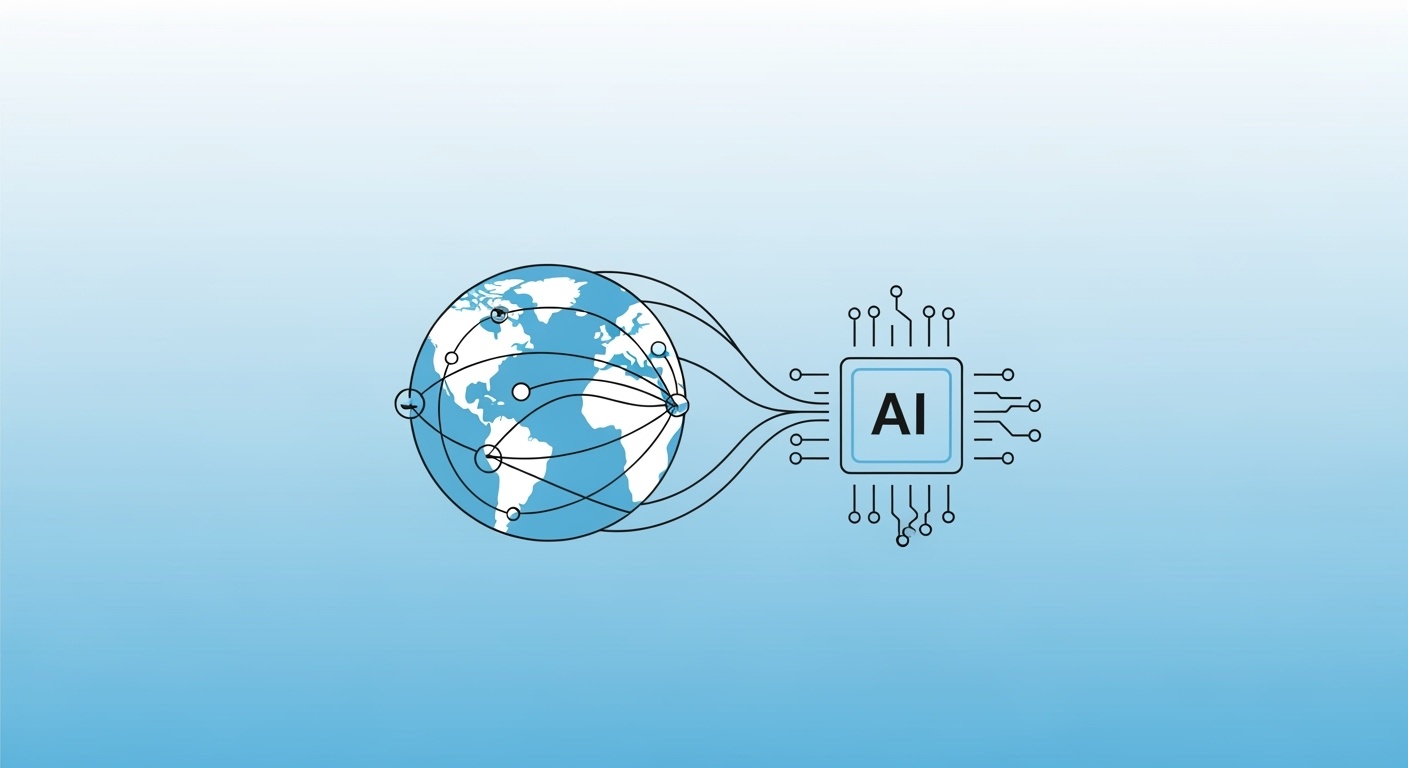-By Bartłomiej Mąkina
In September 2025, Google announced the Agent Payments Protocol (AP2) not just another payments API, but a fundamental shift toward governed agentic commerce. After building a production-grade implementation from the ground up, I can confirm this protocol represents the missing infrastructure for trusted AI-driven transactions that compliance teams have been waiting for.
What AP2 is: An open protocol that creates a cryptographically verifiable chain from user intent through cart formation to final payment execution, using three types of signed mandates as audit-ready evidence.
Why it matters: Enables autonomous, accountable purchases while reducing fraud and dispute friction opening new commerce models like delegated shopping, dynamic bundles, and coordinated multi-merchant transactions.
Who should care: Merchants, payment service providers, wallet providers, issuers, marketplaces, booking platforms, and any organization building on AI agents especially those in regulated industries requiring comprehensive audit trails.
Traditional payment flows assume a human clicks "Buy" on a trusted interface. In agentic commerce, compliance teams need to prove three critical elements:
AP2's solution: verifiable credentials combined with cryptographically signed mandates that form an immutable audit trail from initial intent through final payment execution.
Google developed AP2 in collaboration with over 60 organizations including Mastercard, American Express, PayPal, Coinbase, Salesforce, Shopify, Etsy, and Adyen. This isn't a proprietary walled garden it's an industry movement toward shared trust primitives built on open standards including W3C Verifiable Credentials and FIDO protocols.
AP2 establishes trust through three layered, cryptographically signed mandates:

A signed record capturing what the user wants, including scope, limits, timing, and authorization boundaries. For example: "Find tropical vacation packages under $2,000 for dates in November."
The merchant's signed, immutable offer containing specific items, prices, terms, and conditions. This creates a tamper-evident record ensuring what the user approves is exactly what gets charged.
The user's final signed authorization binding a specific payment method to the verified cart contents. This completes the evidentiary chain from intent through execution.
Together, these mandates create a non-repudiable audit trail that eliminates "mystery purchases" and provides comprehensive evidence for dispute resolution.
To validate AP2's capabilities, I built a complete vacation booking system implementing the full protocol stack. The system demonstrates all critical components working together in a production environment.
Three independent agents communicate using structured TextPart and DataPart payloads:
Every mandate undergoes rigorous security processing:
jose libraryUsing LangChain with Kimi K2 (via OpenRouter), the Shopping Agent:
Integration with Stripe through W3C Payment Request API ensures:
The implementation provides complete transaction visibility critical for regulatory compliance:
This transparency isn't optional it's fundamental to making autonomous systems trustworthy and auditable.
AP2's standardized framework enables sophisticated commerce patterns while maintaining compliance:
While AP2 provides the trust substrate for agent payments, InteliGems adds the governance framework to make those payments defensible in regulated environments:
Demo: https://ap2-nextjs-stripe.vercel.app
GitHub Repository: https://github.com/bartlomiej-makina/ap2-nextjs-stripe
Within the next few years, personal and enterprise agents that understand preferences, optimize purchasing decisions, and execute transactions safely will become as routine as smartphone usage. This transformation requires standardized trust, security, and openness exactly what AP2 delivers as the foundational substrate.
However, substrate alone isn't sufficient. Organizations need governance frameworks that turn AP2's capabilities into defensible, compliant automation. This means proper controls, audit trails, and evidence generation that satisfy regulatory requirements while enabling the efficiency benefits of agentic commerce.
Recent developments show continued momentum: Affirm announced support for AP2 in October 2025 , joining the growing ecosystem of financial institutions and technology companies building on this standard. The protocol's payment-agnostic design supports everything from traditional cards to stablecoins and real-time bank transfers.
InteliGems helps compliance, risk, and audit teams deploy AP2-enabled agent systems with built-in SoD/HITL approvals, policy guardrails, and comprehensive audit trails all running within your security perimeter. Contact us to discuss how AP2 can transform your commerce operations while maintaining regulatory compliance.
AI Trends & Industry Insights

November 12, 2025
AI agents with web search access are parroting unreliable sources Reddit posts, SEO spam, and outdated content leading to a 35% false information rate in 2025. This article exposes 10 critical failure modes of search-powered agents and provides 12 architectural defenses: layered trust scoring, multi-source corroboration, prompt-injection hardening, and citation-first transparency. Discover how Odyssey Scout™ implements these principles to achieve 97% validated output for compliance-critical scenarios. Stop agents from acting on the loudest page learn defense-in-depth strategies for governed web intelligence.

October 13, 2025
This comprehensive evaluation guide analyzes 6 leading AI platforms for automated customs tariff refund processing in 2025, comparing their compliance capabilities, audit trails, and ERP integration. With the Trump tariff implementation creating a $30B-$60B refund opportunity, the guide provides scoring across five key pillars to help importers choose the right automation solution. Featured platforms include InteliGems, Microsoft Azure AI, SAP Intelligent Trade, and Oracle Trade Management with detailed ROI analysis.
Get started today
We’ll map your controls, connect a dataset, and stand up a private POC in 1-4 weeks.